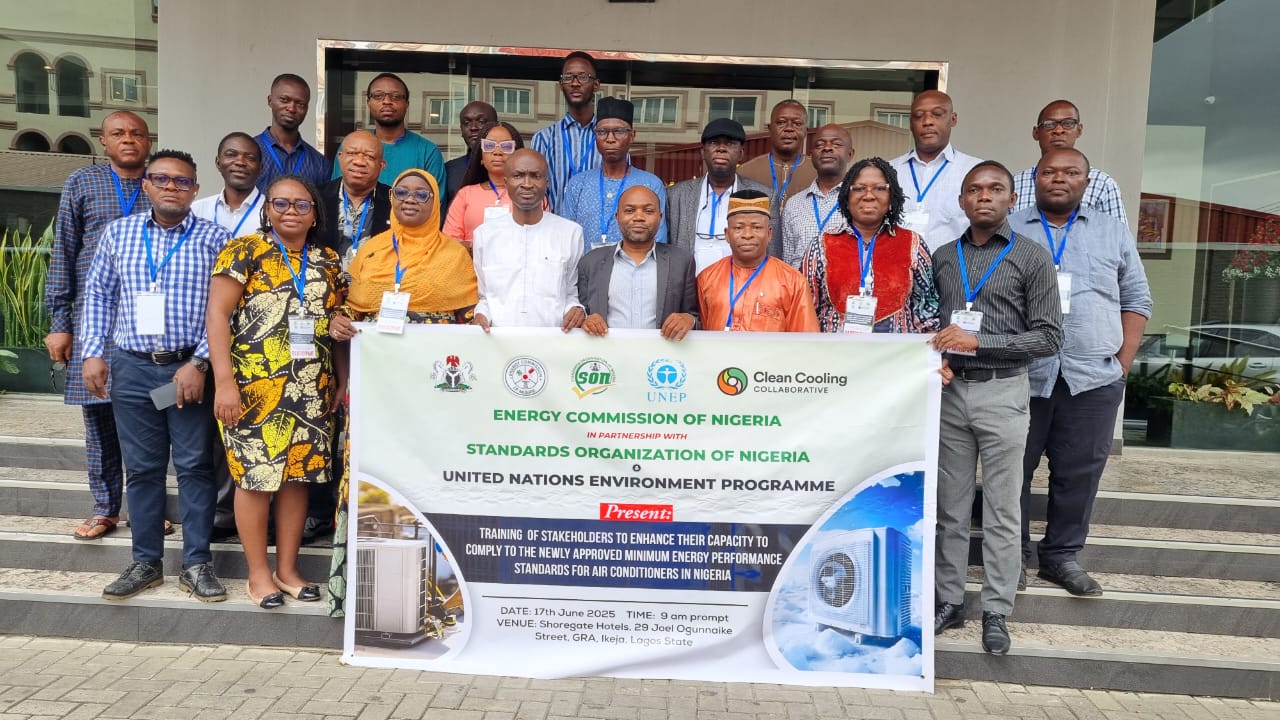Nigeria moves to enforce new energy performance standards for air conditioners
The Energy Commission of Nigeria (ECN), in collaboration with the United Nations Environment Programme (UNEP) and the Standards Organisation of Nigeria (SON), has convened a high-level Training Workshop to build stakeholder capacity for compliance with the newly approved Minimum Energy Performance Standards (MEPS) for air conditioners in Nigeria.
The News Agency of Nigeria (NAN) reports that the workshop, held on Tuesday in Lagos, is part of the ongoing project titled: “Scaling Up Energy-Efficient and Climate-Friendly Cooling in Nigeria NDC Review,” funded by the Clean Cooling Collaborative.
The project is aimed at accelerating Nigeria’s transition to energy-efficient and low-Global Warming Potential (low-GWP) cooling technologies in residential, commercial, and public sectors—helping the country meet its Nationally Determined Contributions (NDCs) under the Paris Agreement.
In his welcome address, Dr. Mustapha Abdullahi, Director-General of the Energy Commission of Nigeria, highlighted the critical importance of energy efficiency in Nigeria’s development trajectory.
“The need for sustainable cooling solutions has never been more urgent. As demand for cooling increases with our economic growth.
“We must adopt innovative and climate-friendly technologies that reduce energy consumption and environmental impact.”
Abdullahi noted that the ECN, as Nigeria’s apex agency for energy policy and planning, was spearheading this re-orientation effort in partnership with UNEP and SON.
He emphasized that the newly revised MEPS, which were approved by the Federal Government following a technical review in June 2024, are now ready for implementation.
He explained that the workshop gathered key players in the air conditioner sector—manufacturers, importers, and distributors—to:
“Raise awareness on the revised MEPS.
‘Build technical capacity for effective compliance.
“Facilitate stakeholder dialogue and feedback.
“Strengthen collaboration between government agencies and the private sector.”
He said that by equipping stakeholders with the necessary knowledge and tools, the ECN aims to ensure smooth implementation of the standards and strengthen Nigeria’s climate action in line with the Renewed Hope Agenda of President Bola Tinubu.
Abdullahi expressed confidence that with sustained collaboration, Nigeria would not only meet its climate and energy efficiency targets, but also serve as a model for other developing nations navigating the transition to sustainable cooling.
Also speaking, Mr Lawal Ismaila, Head of Electrical, SON, noted that the workshop was to create awareness on MEPS for air conditioners which has to do with more efficient air conditioners.
Ismaila said that the old air conditioners consume more energy and more power and they are not environmentally friendly.
“They contain gases that are dangerous to our health which destroy the ozone layer that protects us from the ultra violet rays of the sun and causes cancer.
“We have developed these standards in other for us to improve the efficiency and phase out all the dangerous gases of those dangerous refrigerants.
“By so doing, SON has developed it; we are also part of the international standards.
We need to domesticate these standards and create awareness for manufactures, importers, users and all of us to be aware of the dangers of the old air conditioners that has to do with those dangerous gases that consume so much energy and power,” Ismaila said.
He added that the new ones consume less power, more cooling less energy and environmentally friendly.
Also, Dr leslie Adogame, Executive Director, Sustainable Research and Action for Environmental Development (SRADev Nigeria) said that a country like Nigeria require efficient energy supply.
He said that MEPS for air conditioners has the following key advantages:
“To attain energy efficiency.
” To avoid dumping of inefficient equipment in our environment.
“It is environmentally friendly cooling system
“We are nation trying to move towards net zero and net zero covers every component of equipment as far as energy efficiency is concerned.”
He added that MEPS is to put in place a standard that guides the importation of air conditioners into the country.
He called for greater advocacy for MEPs and a robust stakeholder engagement to drive home the new standards.








ogtuvr